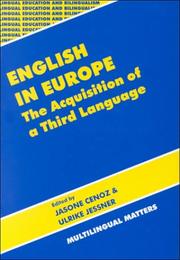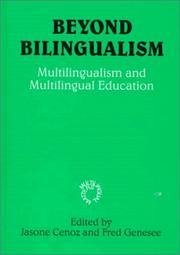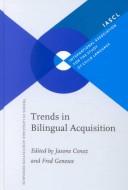| Listing 1 - 10 of 50 | << page >> |
Sort by
|
Book
ISBN: 1281725781 9786611725785 1847690718 9781847690715 9781281725783 184769070X 9781847690708 6611725784 Year: 2008 Publisher: Clevedon [England] ; Buffalo : Multilingual Matters,
Abstract | Keywords | Export | Availability | Bookmark
 Loading...
Loading...Choose an application
- Reference Manager
- EndNote
- RefWorks (Direct export to RefWorks)
This volume focuses on research in education in the Basque Country where Basque is very often the language of instruction for some or all the school subjects. The volume provides background information about the Basque educational system; about academic and linguistic results related to the use of Basque as the language of instruction and the challenges and problems the Basque educational system is currently facing. The volume focuses on research conducted in the Basque Country that can be useful for other bilingual and multilingual contexts involving different language combinations. The articles look at the achievements of the last 25 years but also discuss the challenges the Basque educational system is facing nowadays.
Education, Bilingual --- Native language and education --- Basque language --- Euskara language --- Native language --- Education --- Language and education --- Bilingual education --- Bilingualism --- Multilingual education --- Study and teaching --- Use in schools
Book
ISBN: 1282465961 9786612465963 1847691943 9781847691941 9781847691934 1847691935 9781847691927 1847691927 9781282465961 Year: 2009 Volume: 72 Publisher: Buffalo, N.Y. : Multilingual Matters,
Abstract | Keywords | Export | Availability | Bookmark
 Loading...
Loading...Choose an application
- Reference Manager
- EndNote
- RefWorks (Direct export to RefWorks)
This volume focuses on issues such as the learning, use and assessment of languages in education, the age factor, the teaching of English as an international language and multilingualism at the university, in educational contexts in which several languages are taught either as subjects or languages of instruction. Jasone Cenoz proposes the 'Continua of Multilingual Education' as a tool to identify different types of multilingual schools and focuses on Basque educational research to discuss issues that are relevant for other contexts. 'Towards Multilingual Education: Basque Educational Research in International Perspective' is an up to date and comprehensive review of research involving Basque, Spanish and English in Basque schools. The book will be of great value to researchers, professionals and students interested in multilingualism and multilingual education all over the world.
Education, Bilingual --- Multicultural education --- Multilingualism --- Language and education --- Basque language --- Spanish language --- English language --- Second language acquisition --- Second language learning --- Language acquisition --- Germanic languages --- Castilian language --- Romance languages --- Euskara language --- Educational linguistics --- Education --- Language and languages --- Plurilingualism --- Polyglottism --- Intercultural education --- Culturally relevant pedagogy --- Bilingual education --- Bilingualism --- Multilingual education --- Study and teaching --- Culturally sustaining pedagogy --- Education, Bilingual - Spain - País Vasco --- Multicultural education - Spain - País Vasco --- Multilingualism - Spain - País Vasco --- Language and education - Spain - País Vasco --- Basque language - Study and teaching - Spain - País Vasco --- Spanish language - Study and teaching - Spain - País Vasco --- English language - Study and teaching - Spain - País Vasco --- Second language acquisition - Study and teaching - Spain - País Vasco
Digital
ISBN: 9781847691941 9781847691934 Year: 2009 Publisher: Bristol ;; Blue Ridge Summit Multilingual Matters
Abstract | Keywords | Export | Availability | Bookmark
 Loading...
Loading...Choose an application
- Reference Manager
- EndNote
- RefWorks (Direct export to RefWorks)

ISBN: 1853594792 9781853594793 Year: 2000 Volume: 19 Publisher: Clevedon: Multilingual matters,
Abstract | Keywords | Export | Availability | Bookmark
 Loading...
Loading...Choose an application
- Reference Manager
- EndNote
- RefWorks (Direct export to RefWorks)
English language --- Languages in contact --- Study and teaching --- Foreign speakers. --- Germanic languages --- Study and teaching&delete& --- Foreign speakers --- EFL (Language study) --- English as a foreign language --- English as a second language --- English to speakers of other languages --- ESL (Language study) --- ESOL (Language study) --- Teaching English as a second language --- TEFL (Language study) --- TESL (Language study) --- Foreign students --- English language - Study and teaching - Foreign speakers. --- English language - Study and teaching - Europe. --- Languages in contact - Europe.

ISBN: 1853594210 1853594202 9781853594205 9781853594212 0585125945 Year: 1998 Volume: 110 Publisher: Clevedon: Multilingual matters,
Abstract | Keywords | Export | Availability | Bookmark
 Loading...
Loading...Choose an application
- Reference Manager
- EndNote
- RefWorks (Direct export to RefWorks)
Book
ISBN: 1282715100 9786612715105 3110224488 9783110224481 9783110224474 311022447X 9781282715103 Year: 2009 Publisher: New York, NY : Mouton de Gruyter,
Abstract | Keywords | Export | Availability | Bookmark
 Loading...
Loading...Choose an application
- Reference Manager
- EndNote
- RefWorks (Direct export to RefWorks)
This book is the very first collection of first-person language learning narratives that offers rich introspective data on the various processes and forces shaping the development and maintenance of multiple languages (seven and more) in a single individual. The writers are twelve multilinguals who have been influenced by quite different contextual factors and who have learned a wide range and combination of dialects and languages from both similar and very different linguistic families. The combinations explored in the narratives include some lesser-known languages that come from under-researched areas, such as the African continent, certain parts of Asia, the Middle East, and Eastern Europe. Also unique are two theoretical chapters which analyze the narrative data against the background of language development research findings within several thematic areas: multiple language learning as a complex dynamic system; the influence of bilingualism/multilingualism on the acquisition of additional languages; cross-linguistic influence; and also emotions, motivation, and identity. The aim of this juxtaposition and analysis is to allow a meaningful comparison of the extent to which etic, researcher-generated, and emic, learner-offered perspectives match or diverge, and to identify new questions that the emic data may add to research agendas. The book is an excellent resource not only for researchers but also for teachers as well as for students of language at the graduate and undergraduate level.
Multilingualism --- Psycholinguistics. --- Second language acquisition. --- Second language learning --- Language acquisition --- Language, Psychology of --- Language and languages --- Psychology of language --- Speech --- Linguistics --- Psychology --- Thought and thinking --- Plurilingualism --- Polyglottism --- Psychological aspects. --- Psychological aspects --- Language Teaching. --- Second Language Acquisition.

ISBN: 1282159992 9786612159992 902729481X 9789027294814 9781588110992 1588110990 9789027234711 902723471X 1588110990 902723471X Year: 2001 Publisher: Amsterdam Philadelphia J. Benjamins
Abstract | Keywords | Export | Availability | Bookmark
 Loading...
Loading...Choose an application
- Reference Manager
- EndNote
- RefWorks (Direct export to RefWorks)
The chapters in this volume provide the first comprehensive overview of trends in research on early phonological, lexical, syntactic and pragmatic development in children acquiring two (or more) languages simultaneously. Ongoing as well as emerging issues are examined and discussed by leading researchers in the field. Collectively, these studies extend our knowledge of bilingual acquisition and broaden our understanding of the child's ability to acquire and use language. This volume is of interest to researchers working on language acquisition by monolingual and bilingual children, graduate students of psychology, linguistics and communication sciences, and researchers and professionals concerned with the diagnosis and treatment of bilingual children with language impairment.
Book
ISBN: 1009024655 1107477514 Year: 2015 Publisher: Cambridge : Cambridge University Press,
Abstract | Keywords | Export | Availability | Bookmark
 Loading...
Loading...Choose an application
- Reference Manager
- EndNote
- RefWorks (Direct export to RefWorks)
This cutting edge volume explores holistic trends in multilingualism, analysing the processes of both 'becoming multilingual' and 'being multilingual'. Multilingualism has increased in recent years due to globalisation, transnational mobility and the spread of Information and Communications Technology (ICT). This volume explores some of the trends in the study of multilingual education by putting together research studies that analyse the processes of both 'becoming multilingual' and 'being multilingual' in educational contexts.
Multilingualism. --- Applied linguistics. --- Language acquisition. --- Language transfer (Language learning) --- Language and languages --- Study and teaching. --- Foreign language study --- Language and education --- Language schools --- Transfer, Language (Language learning) --- Language acquisition --- Acquisition of language --- Developmental linguistics --- Developmental psycholinguistics --- Language development in children --- Psycholinguistics, Developmental --- Interpersonal communication in children --- Psycholinguistics --- Linguistics --- Plurilingualism --- Polyglottism --- Study and teaching --- Acquisition --- Language and languages Study and teaching
Book
ISBN: 100902938X 9781009029384 9781009014403 1009014404 1009033999 1009033794 9781009033992 9781009033794 Year: 2021 Publisher: Cambridge : Cambridge University Press,
Abstract | Keywords | Export | Availability | Bookmark
 Loading...
Loading...Choose an application
- Reference Manager
- EndNote
- RefWorks (Direct export to RefWorks)
Learning through the medium of a second or additional language is becoming very common in different parts of the world because of the increasing use of English as the language of instruction and the mobility of populations. This situation demands a specific approach that considers multilingualism as its core. Pedagogical translanguaging is a theoretical and instructional approach that aims at improving language and content competences in school contexts by using resources from the learner's whole linguistic repertoire. Pedagogical translanguaging is learner-centred and endorses the support and development of all the languages used by learners. It fosters the development of metalinguistic awareness by softening of boundaries between languages when learning languages and content. This Element looks at the way pedagogical translanguaging can be applied in language and content classes and how it can be valuable for the protection and promotion of minority languages. This title is also available as Open Access on Cambridge Core.
Translanguaging (Linguistics) --- Linguistics --- Multilingualism --- linguistics --- applied linguistics --- English language teaching --- English as a second language
Book
ISBN: 1800417144 9781800417137 1800417136 9781800417144 1800417152 1800417160 Year: 2023 Publisher: Bristol ; Blue Ridge Summit : Multilingual Matters,
Abstract | Keywords | Export | Availability | Bookmark
 Loading...
Loading...Choose an application
- Reference Manager
- EndNote
- RefWorks (Direct export to RefWorks)
This book provides an overview of how the field of Linguistic Landscape Studies has emerged and developed over the past 20 years, combined with an in-depth exploration of the theoretical approaches, innovative research methods and major themes that have been central to this dynamic area of research.
Linguistic landscape --- Signs and signboards --- Linguistic landscape. --- Semiotics.
| Listing 1 - 10 of 50 | << page >> |
Sort by
|

 Search
Search Feedback
Feedback About UniCat
About UniCat  Help
Help News
News